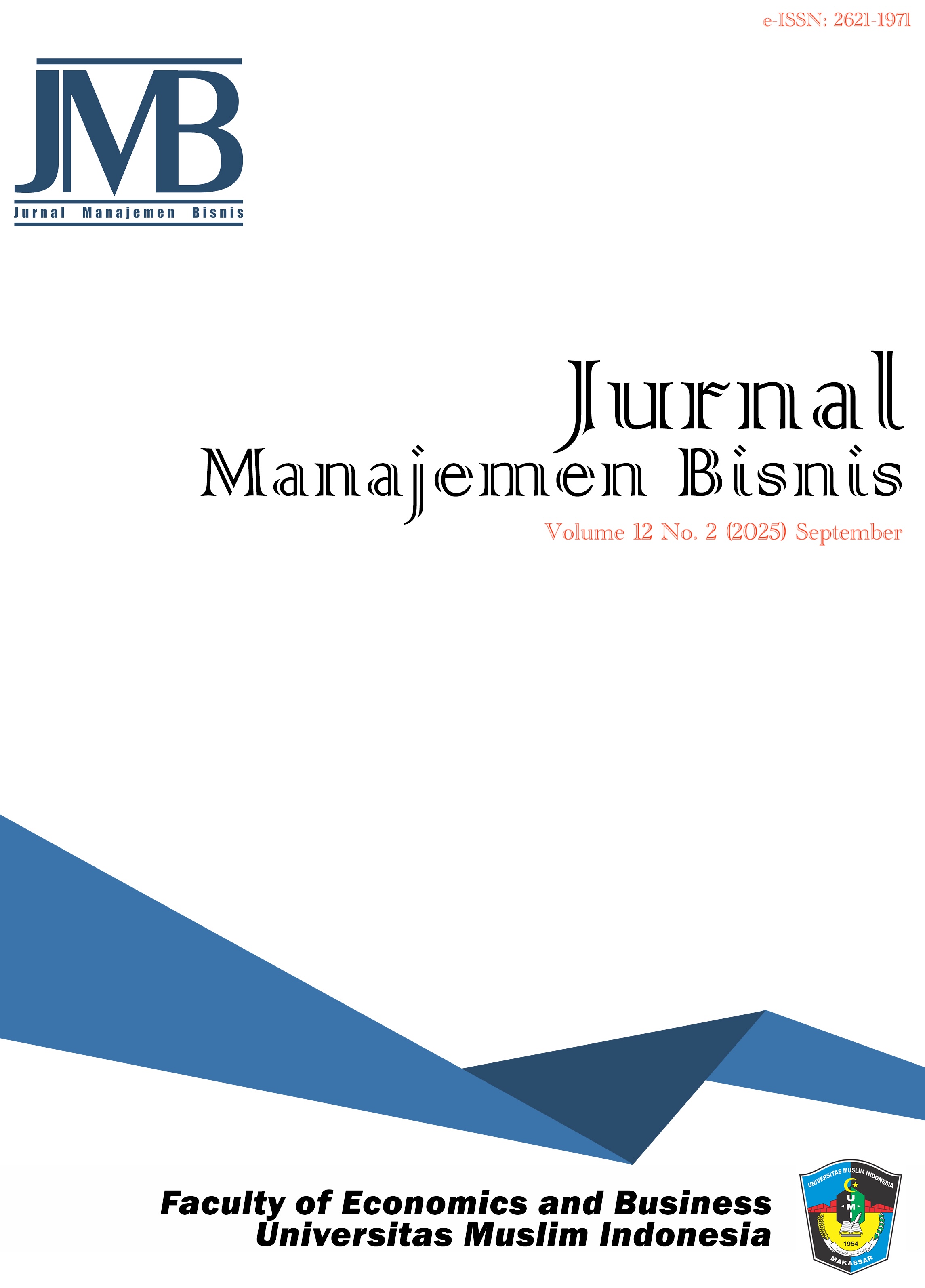Analysis of the Influence of Corporate Maturity Mismatch on the Digital Transformation of Manufacturing Companies in Indonesia
DOI:
https://doi.org/10.33096/jmb.v12i2.1177Keywords:
corporate maturity mismatch, digital transformation, manufacturing industry, fundamental technologies, Indonesia Stock ExchangeAbstract
Digital transformation has become a strategic necessity for companies to maintain competitiveness amid industry disruption. However, the adoption of digital transformation does not always run smoothly because it is influenced by the gap between the structural readiness of the company and the need for long-term investment, known as corporate maturity mismatch. This study aims to analyze the impact of the level of corporate maturity mismatch on the implementation of digital transformation in manufacturing companies listed on the Indonesia Stock Exchange (IDX) during the period 2018–2023. The method used is a quantitative approach with panel data regression analysis, and digital transformation is measured based on the intensity of digital keyword usage in company annual reports. The results indicate that corporate maturity mismatch has a positive impact on overall digital transformation, as well as on fundamental technology categories such as Artificial Intelligence, Blockchain, Cloud Computing, and Big Data. Conversely, no significant impact was found on digital transformation in extended applications technology. These findings indicate that mismatches in financial structure drive companies to respond to such pressures through investments in strategic and long-term digital technologies. This study provides important implications for policymakers and industry players in designing funding strategies and regulations to support the acceleration of national digital transformation.
Downloads
References
BCG. (2015). Industry 4.0: The Future of Productivity and Growth in Manufacturing Industries Industry 4.0. https://www.bcg.com/publications/2015/engineered_products_project
Ding, S., Guariglia, A., & Knight, J. (2013). Investment and financing constraints in China: Does working capital management make a difference? Journal of Banking and Finance, 37(5), 1490–1507. https://doi.org/10.1016/j.jbankfin.2012.03.025
Frank, M. Z., Goyal, V. K., Bechmann, K., Chirinko, R., Dasgupta, S., Hadlock, C., Head, K., Maksimovic, V., Titman, S., & Wruck, K. (2003). Testing the pecking order theory of capital structure $. In Journal of Financial Economics (Vol. 67).
Gujarati, D. N., Burr Ridge, B., Dubuque, I., Madison, I., & New York San Francisco St Louis Bangkok Bogota Caracas Kuala Lumpur Lisbon London Madrid Mexico City Milan Montreal New Delhi Santiago Seoul Singapore Sydney Taipei Toronto, W. (2003). BASIC ECONOMETRICS FOURTH EDITION. www.mhhe.com
Hu, Y., Che, D., Wu, F., & Chang, X. (2023). Corporate maturity mismatch and enterprise digital transformation: Evidence from China. Finance Research Letters, 53. https://doi.org/10.1016/j.frl.2023.103677
Kementerian Perindustrian Indonesia. (2018a). Indonesia Industry 4.0 Readiness Index.
Kementerian Perindustrian Indonesia. (2018b). Making Indonesia 4.0.
Li, M., & Wei, L. (2024). The path of digital transformation driving enterprise growth: The moderating role of financing constraints. International Review of Financial Analysis, 96. https://doi.org/10.1016/j.irfa.2024.103536
Li, X., Peng, X., Chen, L., & Ren, Z. (2024). Firms’ uncertainty perception and asset–debt maturity mismatch. Finance Research Letters, 69. https://doi.org/10.1016/j.frl.2024.106160
Liu, L., Wu, D., & Peng, N. (2025). The impact of COVID-19 and digital transformation on stock price volatility from the perspective of cultural and tourism industries. International Review of Economics and Finance, 101. https://doi.org/10.1016/j.iref.2025.104144
Ma, S., Peng, Y., Wu, W., & Zhu, F. (2022). Bank liquidity hoarding and corporate maturity mismatch: Evidence from China. Research in International Business and Finance, 63. https://doi.org/10.1016/j.ribaf.2022.101776
Maresova, P., Soukal, I., Svobodova, L., Hedvicakova, M., Javanmardi, E., Selamat, A., & Krejcar, O. (2018). Consequences of industry 4.0 in business and economics. In Economies (Vol. 6, Issue 3). MDPI Multidisciplinary Digital Publishing Institute. https://doi.org/10.3390/economies6030046
Portal Informasi Indonesia. (2024). Berkah Transformasi Industri 4.0. https://indonesia.go.id/kategori/editorial/8007/berkah-transformasi-industri-4-0?lang=1Beranda/Editorial////
Vaidya, S., Ambad, P., & Bhosle, S. (2018). Industry 4.0 - A Glimpse. Procedia Manufacturing, 20, 233–238. https://doi.org/10.1016/j.promfg.2018.02.034
Vial, G. (2019). Understanding digital transformation: A review and a research agenda. In Journal of Strategic Information Systems (Vol. 28, Issue 2, pp. 118–144). Elsevier B.V. https://doi.org/10.1016/j.jsis.2019.01.003
Wang, Q., Zhao, X., Zeng, Y., & Weng, J. (2024). Executive equity incentives and corporate digital transformation. Economics Letters, 241. https://doi.org/10.1016/j.econlet.2024.111793
Wang, Y., Wang, T., & Chen, L. (2021). Maturity mismatches of Chinese listed firms. Pacific Basin Finance Journal, 70. https://doi.org/10.1016/j.pacfin.2021.101680
Wei, J., & Shen, Y. (2025). Impact and mechanism of digital transformation on performance in manufacturing firms. Innovation and Green Development, 4(1). https://doi.org/10.1016/j.igd.2025.100205
Xu, G., Li, G., Sun, P., & Peng, D. (2023). Inefficient investment and digital transformation: What is the role of financing constraints? Finance Research Letters, 51. https://doi.org/10.1016/j.frl.2022.103429
Zhu, C., Li, N., & Ma, J. (2024). Impact of CEO overconfidence on enterprise digital transformation: Moderating effect based on digital finance. Finance Research Letters, 59. https://doi.org/10.1016/j.frl.2023.104688
Downloads
Published
Issue
Section
License
Copyright (c) 2025 Jurnal Manajemen Bisnis

This work is licensed under a Creative Commons Attribution 4.0 International License.






